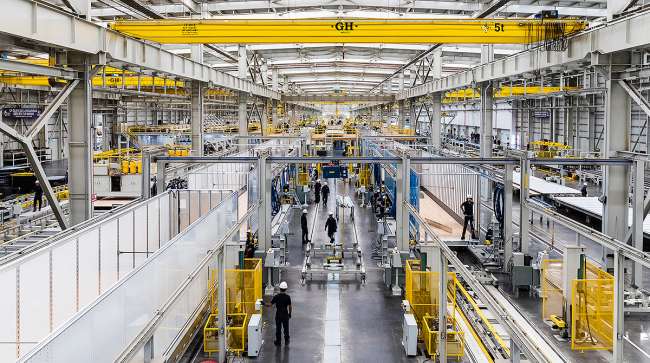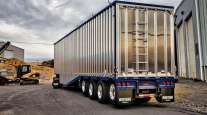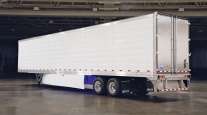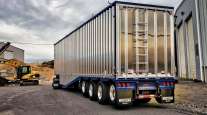Senior Reporter
Cancellations Push June Trailer Orders to Nearly 10-Year Low

[Stay on top of transportation news: Get TTNews in your inbox.]
Preliminary net U.S. trailer orders for June dropped to the lowest point in nearly a decade, just surpassing 6,000, following heavy cancellations amid concerns over the 2020 freight environment, experts said.
Orders plunged 69% to 6,200, compared with a year earlier when they stood at 19,851, ACT Research reported.
Total new orders, before counting cancellations, came in close to 12,000, it said.

East Manufacturing Corp. forecasts its overall trailer business will be off 20% compared with a year earlier.
“Freight for vocational is slowing down. The industry overbought two years in a row, again. As an industry, we never learn,” President Dave de Poincy said. “There is a strong case for a more positive forecast if the government would fund the highway bill and the Federal Reserve drop interest rates.”
The Federal Reserve is scheduled to meet in Washington on July 30-31, and does “look primed to ease by a quarter percentage point,” according to Bloomberg News. Negotiations between the Democrats in Congress and President Donald Trump on a $2 trillion infrastructure plan collapsed in May — and remain in a heap, with scant talk of reviving them.
In the meantime, de Poincy said East Manufacturing has opened its order book for the first quarter of 2020 only, with no price protection.
Stoughton Trailers is very close to getting firm component pricing for 2020 and will open its order board after that occurs, said David Giesen, vice president of sales.
The bigger issue seems to be softening demand, Giesen said, as cancellations were relatively low for Stoughton, but big for industry. “The loose orders are getting pulled or reduced from the backlogs as these customers realize they don’t want as much equipment as they reserved.”
FTR pegged June’s net preliminary orders at 5,500.

Ake
“Only a couple trailer makers have started taking orders for 2020, and fleets did not respond much to this move in June,” said Don Ake, FTR vice president of commercial vehicles. Ake added it was the lowest monthly volume since September 2009. Still, he saw a silver lining.
“It would appear that the market is returning to normal ordering cycles, with fleets evaluating their next-year requirements during the summer and then starting to place those orders around October,” he said.
Stuart James, chief sales officer at Hyundai Translead, said he expects the industry may see another month, maybe two, of this same level and type of activity before the pace picks up again. He added that orders at Hyundai Translead for the third quarter “are reliably fixed and do not represent a concern. Some of our dealers are taking a cautious view, but still others are adding to their inventory and actively pursuing fourth-quarter retail transactions. The same can be said of some equipment lessors. To date — touch wood — the fleets are holding firm. Overall, we anticipate full production for the year.”
At Utility Trailer Manufacturing, there is no mystery as to what is happening. The reasons are the obvious ones, said Craig Bennett, senior vice president of sales.
These include “uncertainty about trailer production costs in 2020 due to the additional tariffs on China, plus the California Health and Safety rule outlawing the sale of refrigerated trailers in California that have used the chemical compound 245fa in the foaming process,” Bennett said.
California is required to reduce emissions of hydrofluorocarbons — greenhouse gases commonly used in refrigeration — by 40% (below 2013 levels) by 2030 under state legislation and regulations that conform to a federal mandate.

HFCs are used in aerosols, foams, refrigeration and air conditioning. The California Air Resources Board has cited them as having a powerful impact on climate as they trap heat in the atmosphere at a rate thousands of times that of carbon dioxide, so much so they have been called super greenhouse gases.
“The new California rule is the most challenging issue as we are still working with our chemical suppliers for suitable replacement formulations, and have been working on it for many months. The rule is scheduled to go into effect Jan. 1,” he said. Bennett also pointed to a slowing economy and lower freight rates, which slows truckers’ capital purchases. In the meantime, “We are largely sold out for 2019 production and have recently begun quoting 2020 production,” he said.
Frank Maly, ACT’s director of commercial vehicle transportation analysis, said, “Despite indications earlier this year that fleets were anxious to place orders for 2020, discussions now indicate that fleets may have shifted to an extremely conservative stance.”
The cancellations are causing churn in the backlog, he said, affecting fourth-quarter production,“and leaving 2019 to close on a weak note, and setting a troublesome foundation for 2020.”




